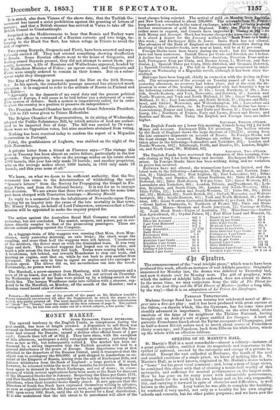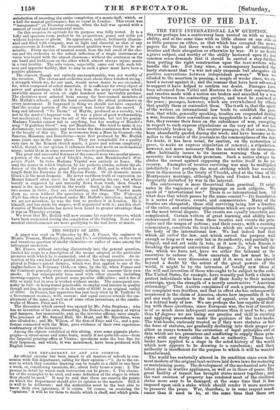OPENING OF ST. MARTIN'S HALL.
St. Martin's Hall is a most remarkable—almost a solitary—instance of a great public edifice, entitled from its magnitude and importance to the epithet of national, erected by the enterprise and energy of a private in- dividual. Except the vast cathedral at Boulogne, the result of the zeal and unaided exertions of a single priest, we know of nothing like it. St. Martin's Hall, as is well known, originated in Mr. Hullah's desire to have a "home" for his great vocal seminary ; and, being a man of large views, he combined this object with that of creating a music-hall worthy of this metropolis, and sufficient for musical performances on the largest scale. How he has gone on for many years with indomitable perseverance, raising funds for the work by his own labour and on his own responsibi- lity, and carrying it forward in spite of obstacles and difficulties, is well known to the public. Long before he was able to complete the building, he rendered it very useful, not only as a locality for his own singing- schools and concerts, but for other public purposes ; and we have now the
satisfaction of recording the entire completion of a music-hall, which, m a hall for musical performance, has no equal in London. This event was "inaugurated" on Thursday evening, when the hall was opened with a concert of vocal and instrumental music.
On this occasion its aptitude for its purpose was fully tested. It is a lofty- and spacious room, perfect in its proportions, grand and noble yet without heaviness or gloom. Its appearance, indeed, brilliantly illumin- ated and filled with company, was as light and cheerful as that of any concert-room in London. Its acoustical qualities were found to be ad- mirable. Every species of musical sound, from the full swell of the cho- rus and the orchestra to the softest inflection of a single instrument or voice, was heard with the utmost clearness—without the confusion on the one hand and feebleness on the other which almost always injure music in a vast locality. The solo voices, especially, came out with such ful- ness and apparent facility, that to sing in such a place must have been a positive pleasure.
The concert, though not entirely unexceptionable, was yet worthy of the occasion. The chorus and orchestra were about three hundred strong; a strength which we, for our part, would never desire to see exceeded; for, when composed of select materials, it is sufficient for every object of power and grandeur, while it is free from the noisy confusion which unwieldy masses of seven or eight hundred must inevitably produce. The choristers were selected from among the best-trained members of Mr. Hash's schools ; and the band contained the ablest performers on every instrument. It happened (a thing we should not have expected) that the secular portion of the concert was better than the sacred. A long and laboured " Te Deum" of Haydn, produced as a novelty, was not in the master's happiest vein. It was a piece of good workmanship, but mechanical ; there was the art of the musician, but not his genius. Madame Viardot cannot fail in anything, but her reading of Handel's song "If guiltless blood" was not Handelian. She tried to make it too declamatory, too dramatic, and thus broke the fine continuous flow which is the beauty of this air. The movements from a Mass by Gounod—the Sanctus, Hosanna, and Benedictus—were first produced by Mr. Mullah some years ago in the same place. They are remarkable for a quality very rare in the Remish church music, a grave and solemn simplicity ; which, though in our opinion it enhances their real merit as ecclesiastical music, unfits them in some measure for concert-performance.
The great and successful features of the concert were two secular pieces; a portion of the second act of Gluck's Orfeo, and Mendelssohn's Wel- _purgis Night. In Orfeo Madame Viardot was entirely at home. She sang the scenes in which Orpheus, by his pathetic strains, softens the ob- duracy of the fiends who guard the portals of Hell, and in which he at length finds his Eurydice in the Elysian Fields. Of all -dramatic music Gluck's is the most dramatic. He never sacrifices truth of expression (as Mozart himself often does) for the sake of pleasing the ear ; but where beauty is suggested by and naturally flows from truth, then Gluck's music is the most beautiful in the world. Such is the case with these two scenes in Orfeo ; they are enchanting, and Madame Viardet made them so, even without the association of the stage. The Walpurgis Night has often been performed under Mr. Hullah's direction ; indeed, if we are not mistaken, he was the first to produce it in London. He is himself, and has made his singers, well acquainted with it; and this chef- d'ceuvre of Mendelssohn has never been heard to greater advantage than it was on Thursday evening.
We trust that Mr. Hullah will now resume his regular concerts, which have been suspended during the completion of the building. None of our musical entertainments are more gratifying to the real lover of music.





































 Previous page
Previous page